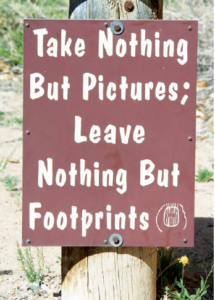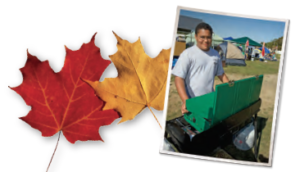Related Advancement and Awards
- Scout Rank requirement 1e
- Second Class requirement 1b
- First Class requirement 1b
- Backpacking, Camping, Climbing, Fishing, Fly-Fishing, Hiking, and Sustainability merit badges
- Outdoor Ethics Awareness Award
- Leave No Trace Achievement Award
- Conservation Good Turn
- Keep America Beautiful
- Environmental Protection Agency Award
The Outdoor Code
Scouting provides many opportunities to plan and participate in rugged outdoor adventures. For more than 60 years, the Outdoor Code has served as an aspirational statement of everything that a Scout or Venturer seeks to achieve while in the outdoors.
As an American, I will do my best to:
Be clean in my outdoor manners. I will treat the outdoors as a heritage. I will take care of it for myself and others. I will keep my trash and garbage out of lakes, streams, fields, woods, and roadways.
Be careful with fire. I will prevent wildfire. I will build my fires only when and where they are permitted and appropriate. When I have finished using fire, I will make sure it is cold-out. I will leave a clean fire ring, or remove all evidence of my fire.
Be considerate in the outdoors. I will treat public and private property with respect. I will follow the principles of Leave No Trace for all outdoors activities.
Be conservation-minded. I will learn about and practice good conservation of soils, waters, forests, minerals, grasslands, wildlife, and energy. I will urge others to do the same.
The Outdoor Code served as the roots of a more comprehensive wilderness ethic called Leave No Trace, which was developed by the National Park Service, the United States Forest Service, and the
Bureau of Land Management. Leave No Trace is an awareness and an attitude rather than a set of rules. We should all practice Leave No Trace in our thinking and actions—wherever we go. Use your judgment and experience to tailor camping and hiking practices to the environment where the outing will occur. Forest, mountain, seashore, plains, freshwater, and wetland environments all require different minimum-impact practices.
Outdoor Ethics

You should always leave your campsite looking the same—if not better—as it did when you arrived. Outdoor ethics means that we follow the principles of both Leave No Trace and Tread Lightly!
Leave No Trace principles apply to most backcountry activities. It also applies to frontcountry camping, too, such as a camping trip to a troop family’s pasture? Imagine what would happen if it rained while your troop trailer was parked in the pasture far from a road. Removing it would tear up the pasture, causing damage that would take months to repair. It would be better to camp closer to the road, haul your gear in by hand, or drop off your gear and remove the trailer before rain sets in.
—> THE PRINCIPLES OF LEAVE NO TRACE
Tread Lightly! – Outdoor ethics draws guidance for many specialized outdoor activities from Tread Lightly! This organization’s mission is to promote responsible outdoor recreation through ethics
education and stewardship programs.
 Travel responsibly.
Travel responsibly.- Respect the rights of others.
- Educate yourself.
- Avoid sensitive areas.
- Do your part.
